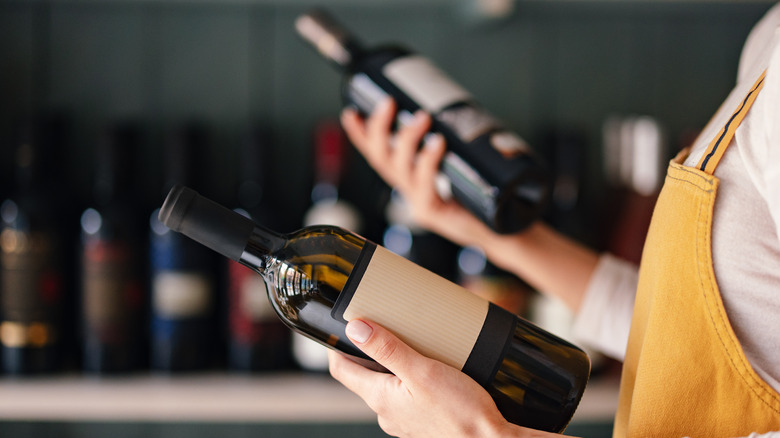Seriously, How Is Wine At Trader Joe's So Cheap?
Many Trader Joe's shoppers appreciate the California-based grocery chain for its unique selection of products and its low prices — especially when it comes to wine. While you can score deals on wine at Costco or pick up a bottle of Aldi's low-cost Winking Owl brand, if Trader Joe's is your go-to, you've got a wide range of options to choose from.
For starters, you could opt for the shop's private label options, which you can often find for around $7 or less. Even if you go with a pricier pick, such as the brand's Platinum reserve choices grown in popular Sonoma County, you won't have to shell out over $20. As co-hosts Tara Miller and Matt Sloane stated in the company's podcast, Inside Trader Joe's, on Episode 57, "Those wines might be $60, $70, $80 in someone else's label or more."
The question is, with TJ's offering such affordable wines, how exactly is the company able to sustain those prices? As it happens, a lot of it boils down to the relationship the chain store has with its suppliers. Plus, the practices some of those suppliers take in producing their booze also help keep the costs down.
Special ties between TJ's and the producers
On Episode 42 of the grocery store's podcast, Inside Trader Joe's, co-host Tara Miller explained that some of the reason the chain is able to reduce prices so much is thanks to the partnerships it has with various vineyards.
Of course, the names of the exact vineyards and wineries the company works with are kept under wraps. As Miller says, "if we say who they are and then we offer this great price, the other folks they do business with they're going to want that same great price, right? And they might not understand all of the other pieces of work that go into us being on the receiving end of such a great price."
Miller's co-host Matt Sloan also noted that the supermarket chains' private-label wines are made at many of the same wineries that produce its non-private label bottles. With those types of Trader Joe's wines, the company gets a different pricing structure because the winery produces the booze but doesn't have to pay for marketing or brand identity, which also helps the TJ's get a great deal.
The wine is produced also matters
The way the wine is produced and packaged also has a major impact on how affordable those bottles are at Trader Joe's. For instance, one of the wineries behind Trader Joe's wine, which is known for producing the company's famous "Two Buck Chuck" Charles Shaw wine, helps keep prices low by operating outside famous California producing areas such as Napa and Temecula Valley. The cheaper costs help reduce the price of growing the grapes. At the same time, the area where the company operates, the San Joaquin Valley, has climate conditions that risk affecting the wine's character, which also lead to an overall more affordable bottle.
At the same time, Trader Joe's uses automation and mass-producing techniques that make it more affordable to produce the blends. Once again, this can affect quality, but ultimately gets you a cheaper bottle of booze. And, of course, the company sources low-cost materials such as cheap corks, lightweight bottles, and economical boxes to keep prices to a minimum. All of these factors lead to you getting great deals on your booze when you head to Trader Joe's for a bottle to pop open at dinner.


